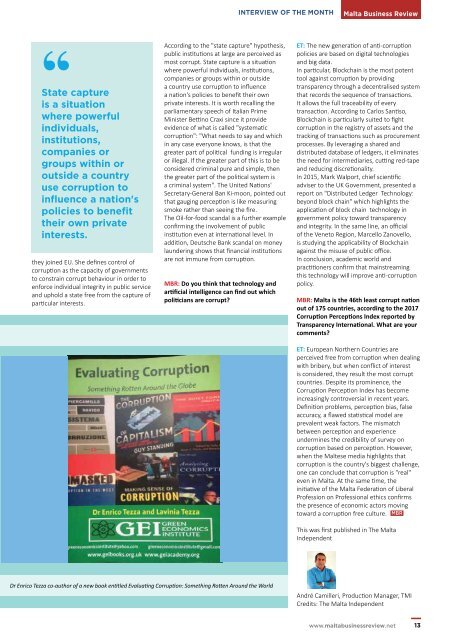MBR_ISSUE 47_JAN_LR
Create successful ePaper yourself
Turn your PDF publications into a flip-book with our unique Google optimized e-Paper software.
INTERVIEW OF THE MONTH<br />
Malta Business Review<br />
"State capture<br />
is a situation<br />
where powerful<br />
individuals,<br />
institutions,<br />
companies or<br />
groups within or<br />
outside a country<br />
use corruption to<br />
influence a nation's<br />
policies to benefit<br />
their own private<br />
interests.<br />
they joined EU. She defines control of<br />
corruption as the capacity of governments<br />
to constrain corrupt behaviour in order to<br />
enforce individual integrity in public service<br />
and uphold a state free from the capture of<br />
particular interests.<br />
According to the "state capture" hypothesis,<br />
public institutions at large are perceived as<br />
most corrupt. State capture is a situation<br />
where powerful individuals, institutions,<br />
companies or groups within or outside<br />
a country use corruption to influence<br />
a nation's policies to benefit their own<br />
private interests. It is worth recalling the<br />
parliamentary speech of Italian Prime<br />
Minister Bettino Craxi since it provide<br />
evidence of what is called "systematic<br />
corruption": "What needs to say and which<br />
in any case everyone knows, is that the<br />
greater part of political funding is irregular<br />
or illegal. If the greater part of this is to be<br />
considered criminal pure and simple, then<br />
the greater part of the political system is<br />
a criminal system". The United Nations'<br />
Secretary-General Ban Ki-moon, pointed out<br />
that gauging perception is like measuring<br />
smoke rather than seeing the fire.<br />
The Oil-for-food scandal is a further example<br />
confirming the involvement of public<br />
institution even at international level. In<br />
addition, Deutsche Bank scandal on money<br />
laundering shows that financial institutions<br />
are not immune from corruption.<br />
<strong>MBR</strong>: Do you think that technology and<br />
artificial intelligence can find out which<br />
politicians are corrupt?<br />
ET: The new generation of anti-corruption<br />
policies are based on digital technologies<br />
and big data.<br />
In particular, Blockchain is the most potent<br />
tool against corruption by providing<br />
transparency through a decentralised system<br />
that records the sequence of transactions.<br />
It allows the full traceability of every<br />
transaction. According to Carlos Santiso,<br />
Blockchain is particularly suited to fight<br />
corruption in the registry of assets and the<br />
tracking of transactions such as procurement<br />
processes. By leveraging a shared and<br />
distributed database of ledgers, it eliminates<br />
the need for intermediaries, cutting red-tape<br />
and reducing discretionality.<br />
In 2015, Mark Walport, chief scientific<br />
adviser to the UK Government, presented a<br />
report on "Distributed Ledger Technology:<br />
beyond block chain" which highlights the<br />
application of block chain technology in<br />
government policy toward transparency<br />
and integrity. In the same line, an official<br />
of the Veneto Region, Marcello Zanovello,<br />
is studying the applicability of Blockchain<br />
against the misuse of public office.<br />
In conclusion, academic world and<br />
practitioners confirm that mainstreaming<br />
this technology will improve anti-corruption<br />
policy.<br />
<strong>MBR</strong>: Malta is the 46th least corrupt nation<br />
out of 175 countries, according to the 2017<br />
Corruption Perceptions Index reported by<br />
Transparency International. What are your<br />
comments?<br />
ET: European Northern Countries are<br />
perceived free from corruption when dealing<br />
with bribery, but when conflict of interest<br />
is considered, they result the most corrupt<br />
countries. Despite its prominence, the<br />
Corruption Perception Index has become<br />
increasingly controversial in recent years.<br />
Definition problems, perception bias, false<br />
accuracy, a flawed statistical model are<br />
prevalent weak factors. The mismatch<br />
between perception and experience<br />
undermines the credibility of survey on<br />
corruption based on perception. However,<br />
when the Maltese media highlights that<br />
corruption is the country's biggest challenge,<br />
one can conclude that corruption is "real"<br />
even in Malta. At the same time, the<br />
initiative of the Malta Federation of Liberal<br />
Profession on Professional ethics confirms<br />
the presence of economic actors moving<br />
toward a corruption free culture. <strong>MBR</strong><br />
This was first published in The Malta<br />
Independent<br />
Dr Enrico Tezza co-author of a new book entitled Evaluating Corruption: Something Rotten Around the World<br />
André Camilleri, Production Manager, TMI<br />
Credits: The Malta Independent<br />
www.maltabusinessreview.net<br />
13
















